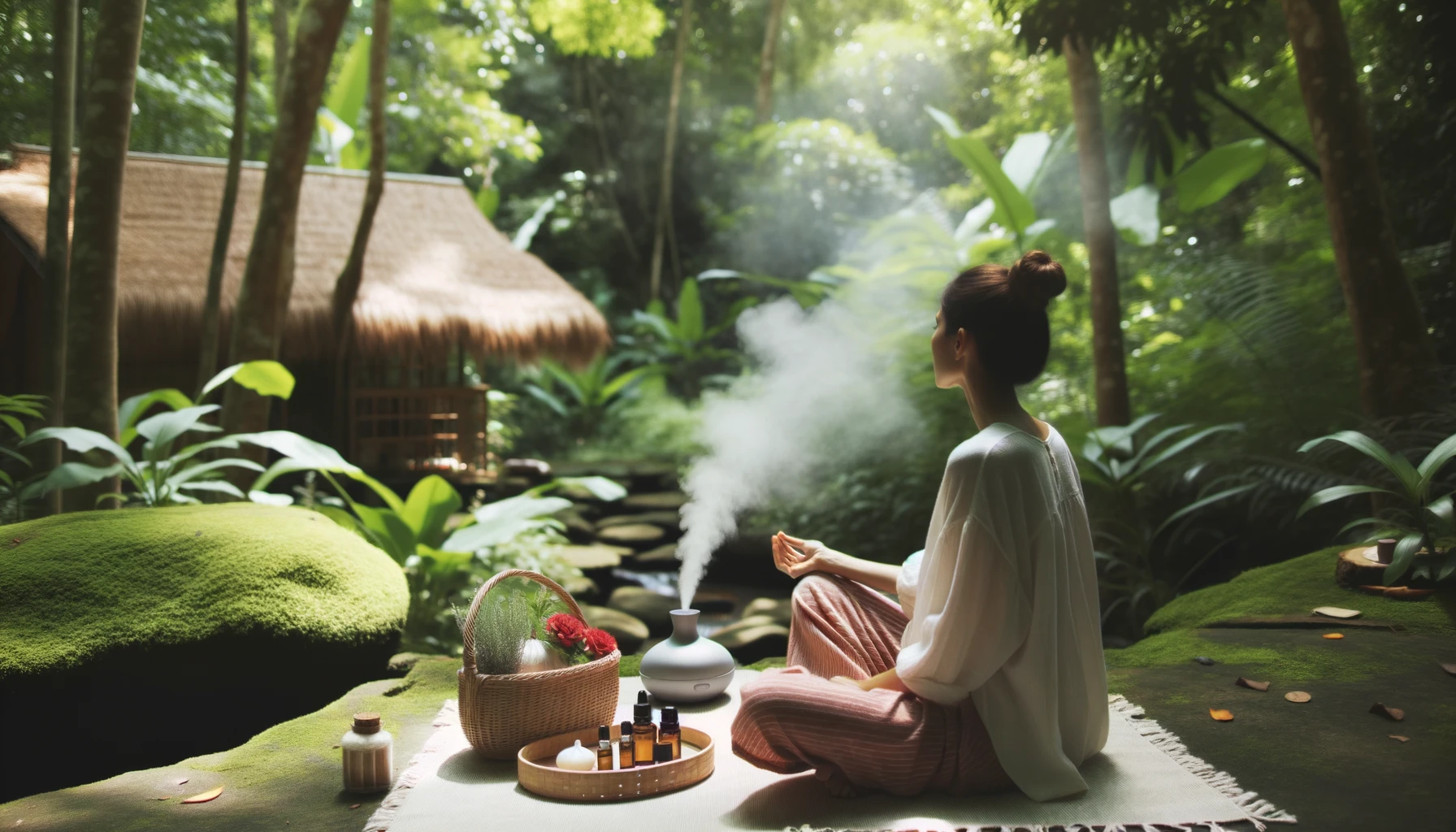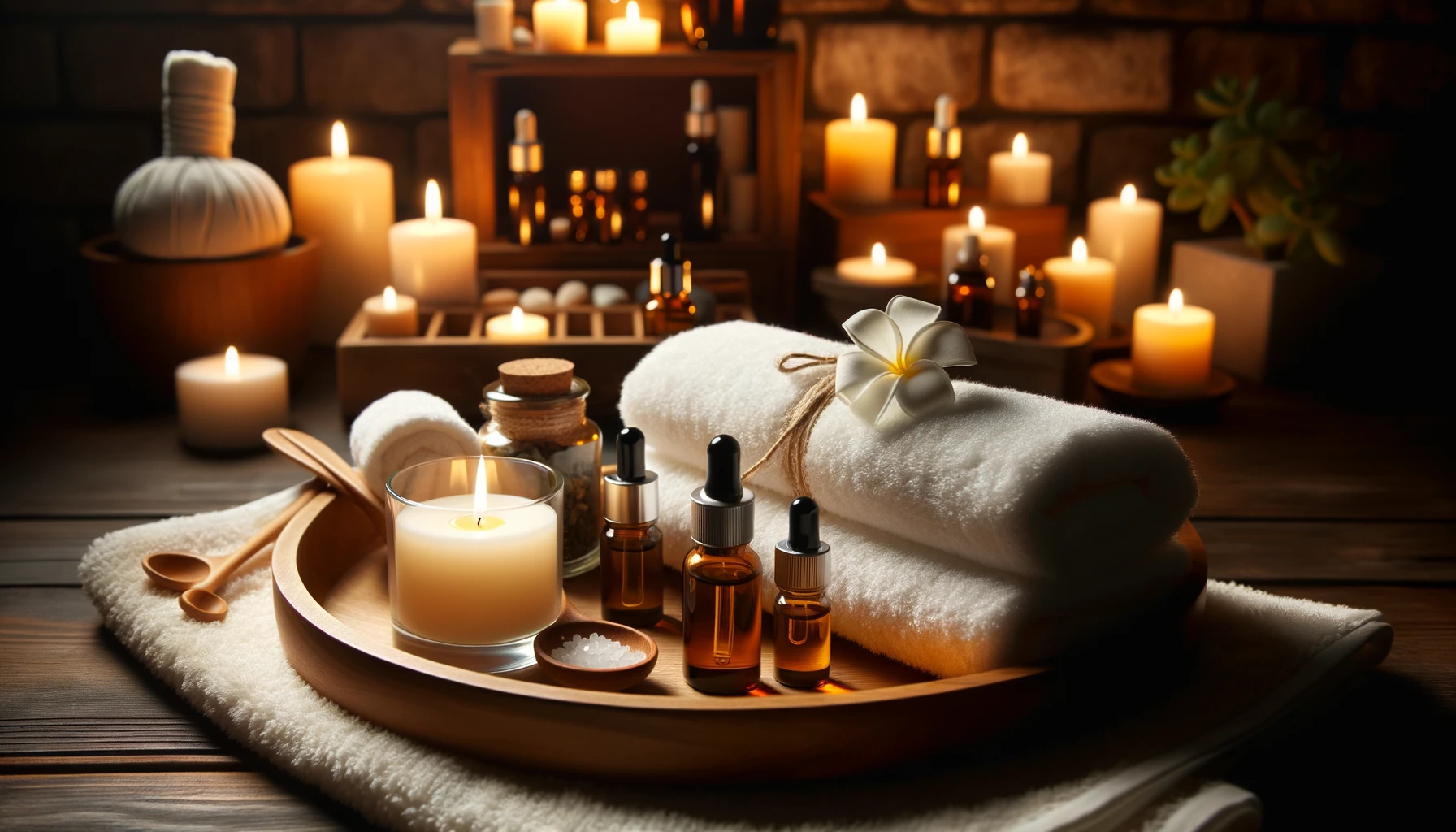
Are you looking for a natural solution to manage and reduce stress? Discover the tranquility of aromatherapy and experience its incredible benefits firsthand.
Key Takeaways:
- Aromatherapy is a holistic practice that can provide relief from stress.
- Common essential oils for stress relief include rosemary, lavender, ylang-ylang, lemon, frankincense, bergamot, and lemongrass.
- Essential oils can be inhaled, applied topically, or used in diffusers or bath salts.
- Aromatherapy activates the emotional center of the brain, induces relaxation, and may affect hormonal levels.
- It is important to use essential oils safely and consult with a healthcare professional if needed.
The Science Behind Aromatherapy for Stress Relief
Aromatherapy works by stimulating the brain’s emotional center, inducing relaxation, and reducing stress levels. Discover the fascinating science behind this holistic practice.
Essential oils, such as rosemary, lavender, ylang-ylang, lemon, frankincense, bergamot, and lemongrass, play a key role in aromatherapy for stress relief. These oils contain chemical compounds that can have a profound impact on our emotions, mood, and overall well-being. When inhaled or applied topically, essential oils can trigger specific responses in the brain, releasing neurotransmitters that promote relaxation and help manage stress.
“The use of essential oils for stress relief dates back centuries and has been studied extensively in recent years. Research has shown that certain scents can directly affect the limbic system, the area of the brain responsible for emotions and memory. This interaction can have a profound effect on our mood and stress levels,” says Dr. Jane Wright, a leading aromatherapist.
Additionally, aromatherapy can influence our hormonal levels. The inhalation of certain essential oils can stimulate the production of endorphins, serotonin, and other neurotransmitters that promote feelings of calm and well-being. These hormonal changes contribute to the overall relaxation effect of aromatherapy.
It is important to use essential oils safely and consult with a healthcare professional if needed. While aromatherapy can be a natural and effective way to manage stress, it is crucial to understand the proper usage and potential contraindications. Some essential oils may cause skin irritation or interact with medications, so it is essential to seek professional guidance when incorporating aromatherapy into your wellness routine.
| Essential Oil | Properties | Benefits |
|---|---|---|
| Rosemary | Invigorating, uplifting | Improves focus, reduces mental fatigue |
| Lavender | Calming, soothing | Promotes relaxation, reduces anxiety |
| Ylang-Ylang | Sweet, floral | Relieves stress, enhances mood |
| Lemon | Energizing, refreshing | Uplifts mood, boosts energy |
| Frankincense | Earthy, woody | Calms the mind, promotes spiritual healing |
| Bergamot | Citrusy, uplifting | Reduces stress, improves mood |
| Lemongrass | Citrusy, fresh | Relieves anxiety, enhances relaxation |
The science behind aromatherapy for stress relief is truly fascinating. By harnessing the power of essential oils, we can tap into the profound effects they have on our emotions and hormonal balance. Whether inhaled, applied topically, or used in diffusers or bath salts, aromatherapy can be an effective and natural way to alleviate stress and promote a sense of calm and well-being. Consult with a healthcare professional or aromatherapist to discover the best essential oils and techniques for your individual needs, and embark on a journey towards a more relaxed and balanced life.
Essential Oils for Stress Relief
Discover the power of essential oils like rosemary, lavender, and ylang-ylang in alleviating stress and creating a sense of calm and relaxation. Aromatherapy, with its use of aromatic plant extracts, has long been recognized for its ability to promote physical and emotional well-being. When it comes to stress relief, essential oils can be a valuable tool in our arsenal.
Essential oils are concentrated extracts derived from plants, capturing their natural fragrance and therapeutic properties. Each oil possesses unique characteristics that can influence our mood and emotions. For stress relief, certain essential oils have proven to be particularly effective.
| Essential Oil | Properties | Methods of Use |
|---|---|---|
| Rosemary | Uplifting, improves focus | Inhalation, massage |
| Lavender | Calming, promotes relaxation | Inhalation, bath, diffuser |
| Ylang-ylang | Sedative, reduces anxiety | Inhalation, massage, bath |
These essential oils can be used in a variety of ways. Inhalation through a diffuser or steam inhalation can provide immediate relief from stress. Massage, when combined with a carrier oil, allows the oils to be absorbed through the skin, promoting relaxation. Adding a few drops of essential oil to your bathwater can create a calming experience, while topical application on pulse points, such as the wrists and temples, can provide a quick pick-me-up.
It’s important to note that essential oils are potent and should be used with caution. Always dilute them properly and perform a patch test before applying to the skin. Consult a healthcare professional if you have any underlying health conditions or if you’re pregnant or breastfeeding. With proper knowledge and guidance, essential oils can be a safe and effective way to manage stress and enhance your overall well-being.
Safe and Effective Use of Essential Oils
Before incorporating essential oils into your stress management routine, it is crucial to understand the safe and effective ways of using them. Aromatherapy can be a powerful tool for reducing stress and promoting relaxation, but it is important to use essential oils responsibly.
When using essential oils topically, always remember to dilute them with a carrier oil to avoid skin irritation. Popular carrier oils include almond oil, coconut oil, and jojoba oil. Before applying the diluted mixture to your skin, perform a patch test to check for any allergic reactions.
| Method | Description |
|---|---|
| Inhalation | Inhaling essential oils can have an immediate and direct impact on the brain, promoting relaxation and reducing stress. Add a few drops of oil to a diffuser or inhale directly from the bottle. |
| Topical Application | Apply diluted essential oil to your skin, focusing on pulse points or areas of tension. Massage the oil gently into your skin using circular motions. |
| Diffusers | Diffusers are a popular way to disperse essential oils throughout a room. Use a diffuser with water and a few drops of oil to create a calming atmosphere. |
| Bath Salts | Add a few drops of essential oil to a warm bath along with Epsom salts for a soothing and relaxing experience. |
It is also important to note that not all essential oils are safe for everyone. Some oils may cause allergic reactions or interact with certain medications. If you have any underlying health conditions or are pregnant or breastfeeding, it is recommended to consult with a healthcare professional before using essential oils.
By using essential oils safely and responsibly, you can harness the power of aromatherapy to reduce stress, promote relaxation, and improve your overall well-being.
Aromatherapy Beyond Oils: Scented Candles
If you prefer a different approach to aromatherapy, scented candles can provide a soothing environment and help alleviate stress. The gentle glow and comforting scents of scented candles can create a calming ambiance that promotes relaxation and tranquility.
Scented candles are available in a variety of fragrances, and each scent can evoke different emotions and sensations. For stress relief, scents such as frankincense, myrrh, spearmint, eucalyptus, cinnamon, sandalwood, vanilla, and lavender are known for their calming properties. These fragrances can help ease tension, reduce anxiety, and promote a sense of well-being.
When using scented candles for stress relief, it’s important to create a safe and conducive environment. Place the candle in a secure holder on a heat-resistant surface and keep it away from flammable objects. Always follow the manufacturer’s instructions for proper use and burning times.
For an enhanced experience, consider pairing scented candles with other calming elements like soft music, a warm bath, or a relaxing book. Creating a peaceful ritual with scented candles can provide a much-needed break from the stresses of daily life and help restore balance to the mind and body.
| Scent | Properties |
|---|---|
| Frankincense | Calming, grounding, and promoting deep relaxation. |
| Myrrh | Soothing, comforting, and promoting introspection. |
| Spearmint | Refreshing, uplifting, and relieving mental fatigue. |
| Eucalyptus | Cleansing, invigorating, and promoting clear breathing. |
| Cinnamon | Warming, comforting, and promoting a sense of security. |
| Sandalwood | Grounding, balancing, and enhancing mindfulness. |
| Vanilla | Sweet, soothing, and evoking a sense of comfort. |
| Lavender | Relaxing, calming, and promoting restful sleep. |
If you’re looking for a different way to experience the benefits of aromatherapy, scented candles can be a wonderful addition to your stress relief routine. The gentle flicker of the flame and the enchanting aromas can create a serene atmosphere that nurtures your well-being and helps you find moments of peace in the midst of daily life.
Affordability and Convenience of Aromatherapy
You don’t need to break the bank to enjoy the benefits of aromatherapy. Discover how affordable and convenient this stress management technique can be. With a wide range of essential oils and scented candles available at varying price points, there is an option to suit every budget and preference.
One of the most cost-effective ways to incorporate aromatherapy into your routine is by using essential oils. These potent plant extracts can be found in small bottles and can last for a long time, as only a few drops are needed per use. Plus, with the option to mix and blend different oils, you can create personalized aromatherapy blends that cater to your specific stress-relief needs.
In addition to essential oils, scented candles can also provide an affordable and convenient way to enjoy the benefits of aromatherapy. The warm glow and captivating scents of candles create a soothing environment that promotes relaxation. Look for candles made with natural soy or beeswax, as they tend to burn longer and release fragrance more effectively.
Create Your Own Aromatherapy Oasis
Enhance the affordability and convenience of aromatherapy by turning your home into a calming oasis. Start by designating a space where you can unwind and practice your aromatherapy techniques. It could be a cozy corner of your bedroom or a dedicated area in your living room.
Next, consider investing in a diffuser or a vaporizer. These devices disperse the aroma of essential oils into the air, creating a tranquil atmosphere. Look for models that offer features like adjustable settings and timers, allowing you to tailor your aromatherapy experience to your needs and preferences.
To immerse yourself fully in the calming effects of aromatherapy, why not create a relaxing bath time routine? Add a few drops of your favorite essential oil to your bathwater or sprinkle in some aromatherapy bath salts. Not only will this help to melt away stress, but it will also leave your skin feeling refreshed and rejuvenated.
| Technique | Description |
|---|---|
| Inhalation | Inhale the aroma of essential oils directly from the bottle or use a diffuser to create a calming ambiance in your space. |
| Topical Application | Dilute essential oils with a carrier oil, such as jojoba or coconut oil, and apply them to pulse points, temples, or the back of your neck for a soothing effect. |
| Bath Soaks | Add a few drops of essential oil or aromatherapy bath salts to your bathwater to create a luxurious and stress-relieving bathing experience. |
“Aromatherapy is a wonderful way to create a peaceful sanctuary in your own home. By incorporating essential oils and scented candles into your daily routine, you can enjoy the benefits of stress relief without breaking the bank.” – Aromatherapy Expert
Remember, while aromatherapy can be a powerful tool for stress reduction, it is important to use essential oils safely and consult with a healthcare professional if needed. With its affordability and convenience, aromatherapy can be a valuable addition to your self-care routine, helping you find moments of calm and relaxation in the midst of a busy modern life.
Seeking Professional Guidance for Aromatherapy
While aromatherapy is generally safe, it is always best to seek professional guidance, especially if you have underlying health conditions or are taking any medications. Aromatherapy involves the use of concentrated essential oils, which can have powerful effects on the body and mind. It’s important to understand how to use these oils safely and effectively to achieve the desired results. A healthcare professional or certified aromatherapist can provide personalized guidance and recommendations based on your specific needs and circumstances.
Professional guidance is particularly important if you have any allergies or sensitivities to certain scents or ingredients. Essential oils may trigger allergic reactions or interactions with medications, so it’s crucial to consult with a healthcare professional to ensure that aromatherapy is right for you. They can help identify any potential risks or contraindications and guide you towards suitable oils and techniques that align with your health goals.
In addition to addressing individual concerns, a healthcare professional or certified aromatherapist can educate you on proper dilution ratios, inhalation methods, and application techniques. They can provide insights on the best ways to incorporate aromatherapy into your daily routine and tailor the experience to your preferences. Seeking professional guidance can help maximize the benefits of aromatherapy while minimizing any risks or adverse effects.
Remember, aromatherapy is a complementary therapy, and it should not replace professional medical advice or treatments. It can be used in conjunction with other stress management strategies, such as exercise, meditation, and healthy lifestyle habits. By seeking professional guidance, you can ensure that you are using aromatherapy safely and effectively to support your overall well-being.
Improve Your Well-being with Aromatherapy
Discover how the power of aromatherapy can significantly improve your overall well-being and help you effectively manage stress. Aromatherapy, a holistic practice that utilizes essential oils, has been proven to provide relief from stress and promote a sense of calm and relaxation.
Essential oils such as rosemary, lavender, ylang-ylang, lemon, frankincense, bergamot, and lemongrass are commonly used in aromatherapy for their stress-relieving properties. These oils can be inhaled, applied topically, or used in diffusers or bath salts, allowing you to incorporate aromatherapy into your daily routine with ease.
Aromatherapy activates the emotional center of the brain and induces relaxation, which can have a positive impact on your stress levels. Additionally, certain essential oils may affect hormonal levels, further contributing to stress reduction. However, it is important to use essential oils safely and responsibly. If you have any concerns or specific health conditions, consulting with a healthcare professional is recommended.
For those who prefer alternative options, scented candles can also provide stress relief. Scents like frankincense, myrrh, spearmint, eucalyptus, cinnamon, sandalwood, vanilla, and lavender have been found to have calming effects, creating a soothing environment that promotes relaxation and well-being.
Aromatherapy and scented candles offer affordable and convenient ways to alleviate stress and improve your overall well-being. Whether you choose to incorporate essential oils or enjoy the benefits of scented candles, the power of aromatherapy can be a valuable tool in your stress management journey.
FAQ
Is aromatherapy effective for stress relief?
Yes, aromatherapy is a holistic practice that can provide relief from stress. The use of essential oils and scented candles can help induce relaxation and promote a sense of calm.
What are some common essential oils used for stress relief?
Rosemary, lavender, ylang-ylang, lemon, frankincense, bergamot, and lemongrass are commonly used in aromatherapy for their stress-relieving properties.
How can essential oils be used in aromatherapy?
Essential oils can be inhaled, applied topically, used in diffusers, or added to bath salts for aromatherapy purposes.
How does aromatherapy work to relieve stress?
Aromatherapy activates the emotional center of the brain and may affect hormonal levels, inducing relaxation and reducing stress.
Can scented candles be used for stress relief?
Yes, scented candles with calming scents like frankincense, myrrh, spearmint, eucalyptus, cinnamon, sandalwood, vanilla, and lavender can also provide stress relief.
Is aromatherapy an affordable and convenient option for stress relief?
Yes, aromatherapy and scented candles are affordable and can be easily incorporated into daily routines for stress relief.
Is it important to use essential oils safely?
Yes, it is important to use essential oils safely. Consult with a healthcare professional if needed and follow recommended guidelines for inhalation, topical application, and use in diffusers or bath salts.
When should I seek professional guidance for aromatherapy?
It is advisable to seek professional guidance, such as consulting with a healthcare professional, before starting an aromatherapy regimen, especially if you have specific health concerns or conditions.
How can aromatherapy improve overall well-being?
Aromatherapy can contribute to stress reduction, promote relaxation, and improve overall well-being by creating a calming atmosphere and stimulating the senses.



